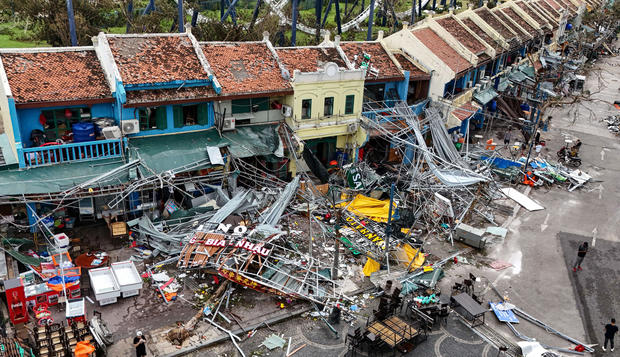
Typhoon Yagi hits Vietnam with torrential rains, killing almost 60 as vehicles and a bridge are swept away
Hanoi, Vietnam— A bridge collapsed and a bus was swept away by flooding Monday as more rain fell after Typhoon Yagi made landfall in Vietnam, causing at least 59 deaths in the Southeast Asian country and disrupting businesses and factories in the export-focused northern industrial hubs, state media reported. Nine people died when the typhoon made landfall Saturday before weakening to a tropical depression, and at least 50 others have died in the consequent floods and landslides, state media VN Express reported. The water levels of several rivers in northern Vietnam were dangerously high.
A passenger bus carrying 20 people was swept into a flooded stream by a landslide in mountainous Cao Bang province Monday morning. Rescuers were deployed but landslides blocked their path.
In Phu Tho province, rescue operations were continuing after a steel bridge over the engorged Red River collapsed Monday morning. Reports said 10 cars and trucks along with two motorbikes fell into the river. Three people were pulled out of the river and taken to the hospital, but 13 others were missing.
NHAC NGUYEN/AFP/Getty
Pham Truong Son, 50, told VNExpress that he was driving on the bridge on his motorcycle when he heard a loud noise. Before he knew what was happening, he was falling into the river. “I felt like I was drowned to the bottom of the river,” Son told the newspaper, adding that he managed to swim and hold on to a drifting banana tree to stay afloat before he was rescued.
How climate change is fueling stronger atmospheric rivers
05:06
Storms like Typhoon Yagi are “getting stronger due to climate change, primarily because warmer ocean waters provide more energy to fuel the storms, leading to increased wind speeds and heavier rainfall,” said Benjamin Horton, director of the Earth Observatory of Singapore.
The strengthening of storms due to the changing climate is not a problem limited to one region. Scientists have warned for years that virtually every major body of water is warming, from the Pacific to the Indian Ocean, fueling more powerful and unpredictable weather phenomena and threatening human population centers across the globe.
More
More
Source: cbsnews.com